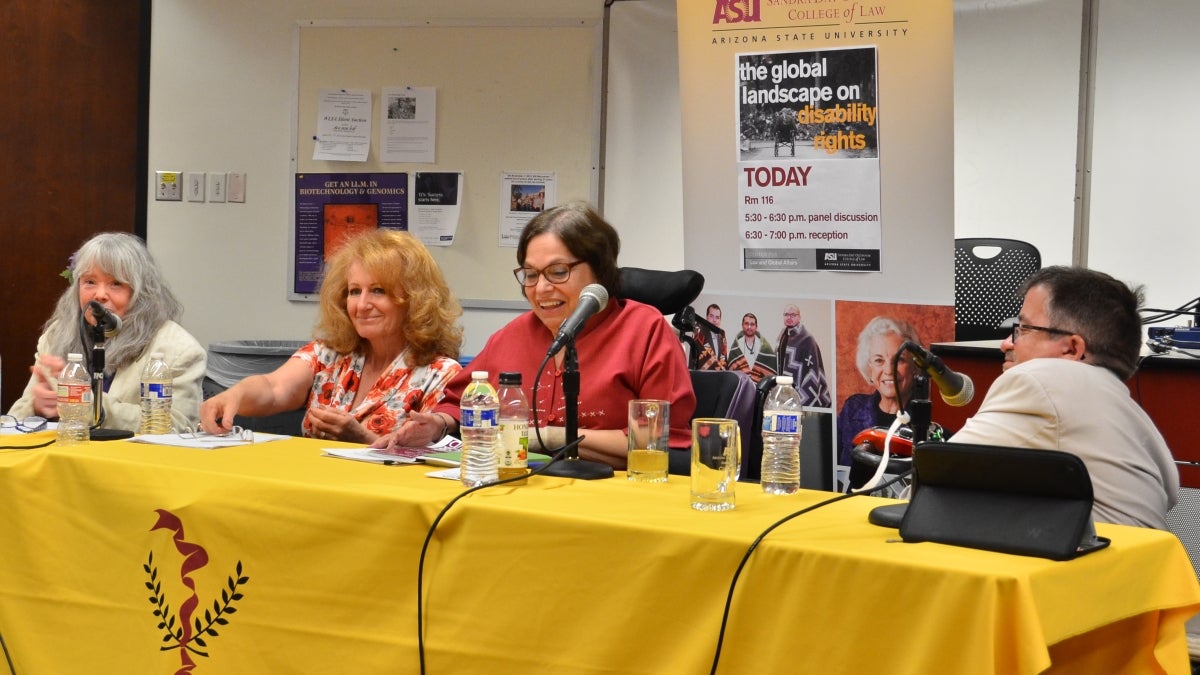Panel discusses global disability rights

For U.S. citizens familiar with the Americans with Disabilities Act (ADA), it may be hard to believe that residents and visitors with disabilities outside of U.S. borders are not always guaranteed protection from discrimination or the right to accessibility accommodations. But the protections afforded by the ADA are not recognized in other countries, and many nations don’t have equivalent laws in place.
The Convention on the Rights of Persons with Disabilities, a document known as the “Disabilities Treaty” and adopted by the international community, was developed in collaboration with the disability community to address this disparity. The Disabilities Treaty is a call to action for all participating countries to protect the rights of people with disabilities on an equal basis with others. To date, over 140 countries have joined the Disabilities Treaty, and the Obama administration is pursuing congressional ratification of the treaty.
Judith Heumann, U.S. Department of State Special Advisor for International Disability Rights and recognized leader in the disability community, visited Arizona State University last week and spoke about the value of the treaty during a panel discussion on Monday evening. The panel, titled "The Global Landscape of Disability Rights," was held at the Sandra Day O’Connor College of Law and was co-sponsored by the Center for Law and Global Affairs and ASU Global. Charles Herf, faculty associate at the College of Law and lawyer representative to the U.S. Court of Appeals Ninth Circuit, moderated the discussion.
“We are honored to have Judy visit Arizona to talk about the importance of the international Disabilities Treaty, which the U.S. has not ratified, and for her to learn more about ASU’s innovative disability rights initiatives and global programs,” said Daniel Rothberg, Lincoln Fellow in the School of Politics and Global Studies and representative of ASU Global.
Heumann was joined on the panel by Amina Donna Kruck, vice president of advocacy programs, Arizona Bridge to Independent Living; Joanne Philips, owner of Arizona Education Cadre and former deputy associate superintendent at the Arizona Department of Education; and Ed Myers, deputy executive director, Arizona Center for Disability Law. Each panelist emphasized the importance of U.S. ratification of the Disabilities Treaty.
The panel discussed the potential for the treaty to protect citizens and benefit American businesses. For example, it would ensure protection of U.S. veterans with disabilities who work overseas for the government or U.S. companies.
No new legislation or commitments would result from U.S. ratification of the treaty. However, Heumann noted that by not ratifying, the U.S. risks being left out of conversations about global protection of people living with disabilities.
“The Conventions (included in the Disabilities Treaty) are great restatements of American principles,” noted Myers.
In a recent State Department video message, Heumann spoke of the impact of the treaty on university students.
“More students with disabilities are attending universities than in years past, and have the same career aspirations as students without disabilities. You want to study, work, travel and serve your country abroad. But many countries don’t have the same accessibility standards or protections against discrimination as we do in the United States,” she said.
On Monday, Heumann emphasized the significance of bringing the conversation to universities and to ASU in particular. She said that she has learned valuable lessons during her visit to ASU about the ways universities can build successful global partnerships and serve as models of accessibility to the international community. In particular, she noted ASU’s Higher Engineering Education Alliance Program in Vietnam as an avenue for showcasing the disability resources that are part of the university.
“We are excited to be part of this important discussion,” said Sethuraman “Panch” Panchanathan, senior vice president of ASU’s Office of Knowledge Enterprise Development. “ASU is an exemplar of inclusivity in higher education, being named one of America’s ‘most disability-friendly colleges.’ In addition, our faculty and students advance research and innovate new technologies that empower people with disabilities.”
Written by Kelsey Wharton, Office of Knowledge Enterprise Development
Media contact:
Amelia Huggins, amelia.huggins@asu.edu
Office of Knowledge Enterprise Development
(480) 965-1754